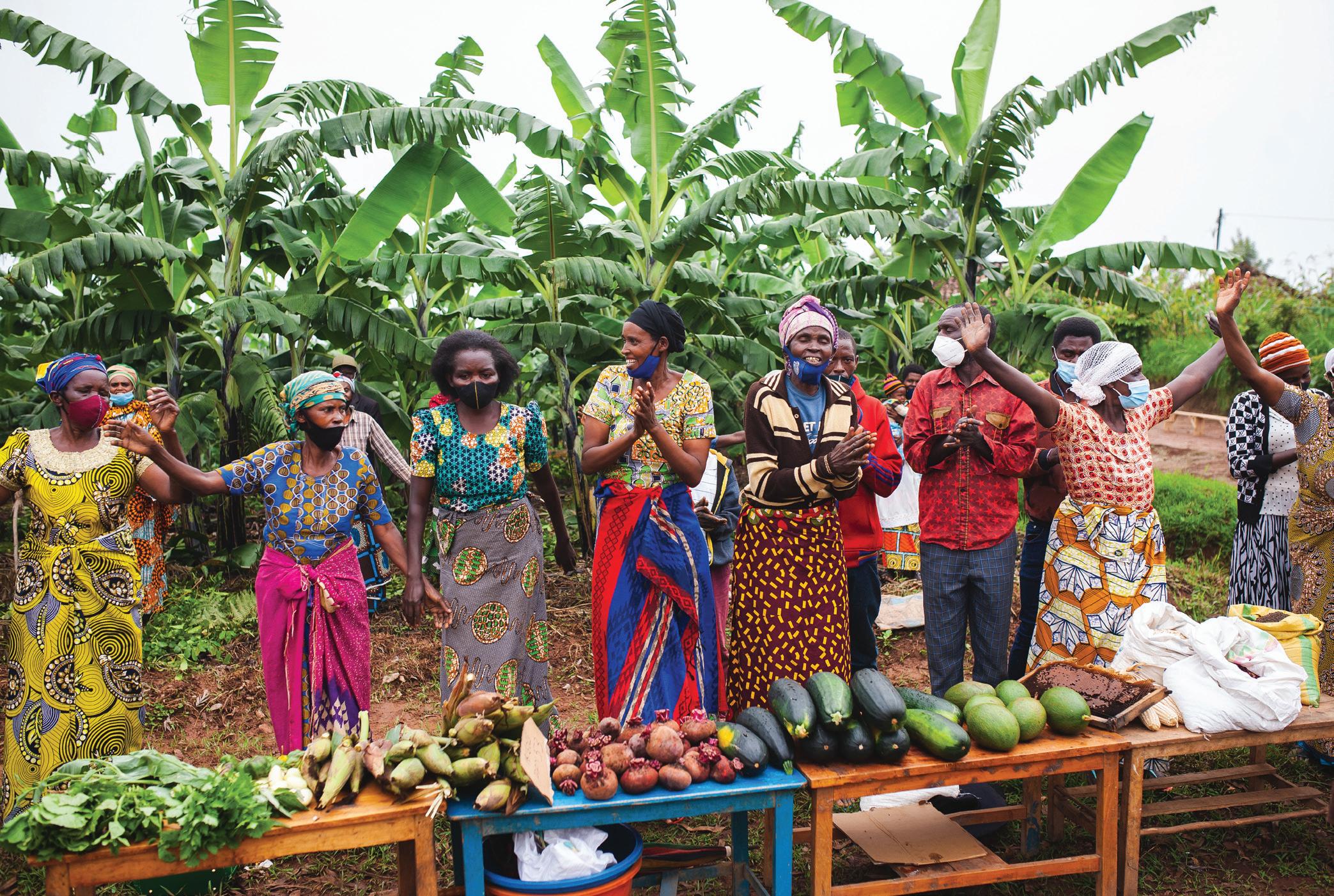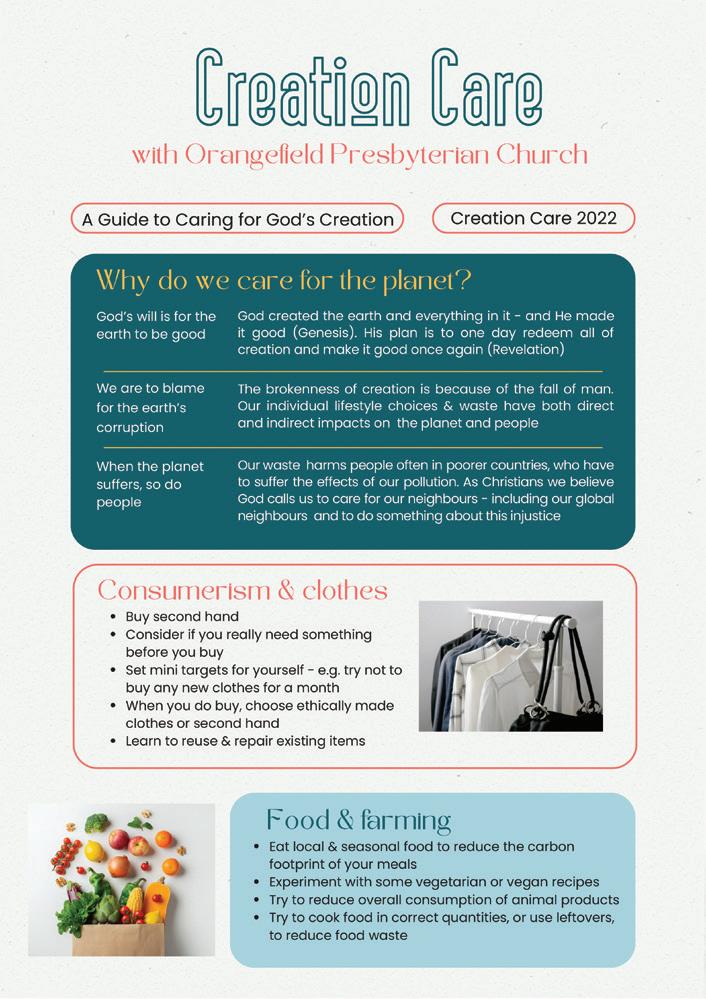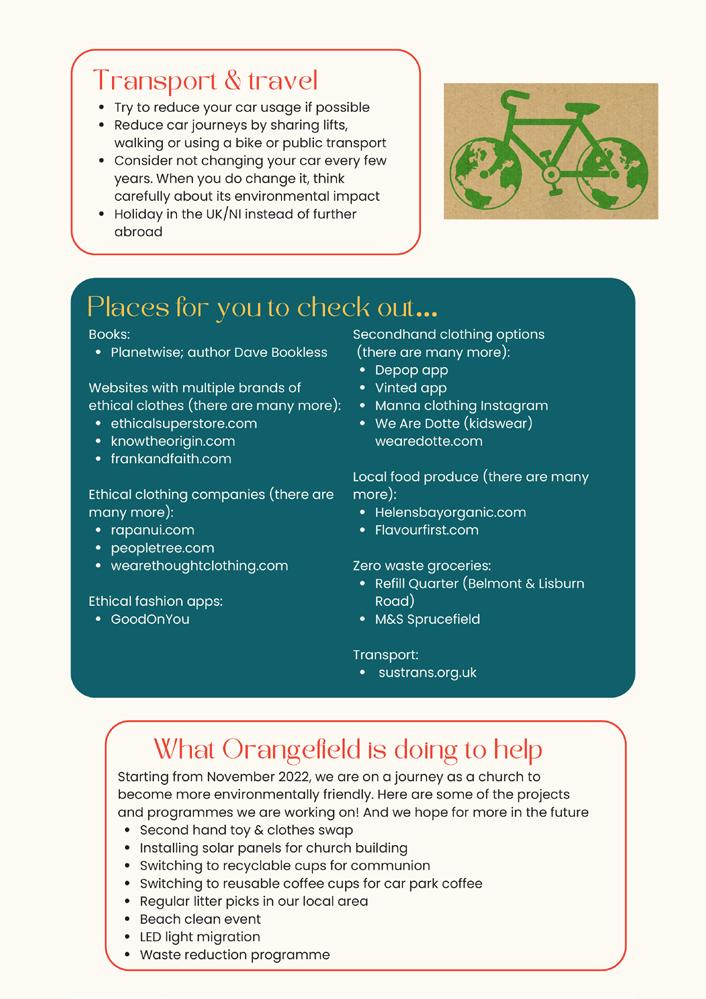
7 minute read
Going greener
Deborah Ford outlines Orangefield Presbyterian Church’s steps towards creation care.
We all know we’re living through an unprecedented environmental crisis – but how does this impact the life and ministry of your average urban congregation? The answer in Orangefield until recently? Not very much, to be quite honest. We give thanks, of course, for the land at harvest; we know God’s plan in Genesis 1. But when the nearest we get to the soil is our shrink-wrapped shopping from Tesco or Lidl, it’s hard to make those vital connections between care for God’s world and our daily routines. An intriguing quotation from the Ulster Farmers’ Union is: “There are two spiritual dangers in not owning a farm. One is the danger of supposing that breakfast comes from the grocery, and the other that heat comes from the furnace.” Does the convenience of modern urban living carry innate spiritual dangers: ingratitude; thoughtlessness; self-dependence?
Certainly, environmental issues never used to feature in Orangefield’s mission statements and business agendas.
The catalyst for change came from our relationships in mission overseas. Through links with Cambodia, India and East Africa, we’d long been convinced of the need for integral mission, but it was a new partnership with Tearfund Rwanda in 2021 that softened our hearts and sharpened our spirits.
Mention Rwanda and you inevitably think of genocide; reconciliation continues to be a major aspect of the church’s work there. But by far the biggest challenge for Rwanda today is man-made climate change.
“The impact is huge, and complicates our work in so many ways,” says Tearfund’s Rwanda country director, Emmanuel Murangira. “There are so many changes in the seasons and rainfall patterns. The dry periods last longer. In 2021 many people died because there’d been no rain for two years, and so they missed two harvests. When it does rain, it’s so strong that it causes landslides, eroding the topsoil and destroying water resources and crops. When it floods, you lose everything. There’s no money left, and no harvest either: you’re back to being below the poverty line.”
To put this in context, over 70% of Rwandans are subsistence farmers. 39% of the population live below the poverty line and 16% live in ‘extreme poverty’ (lacking even essential goods and services). Climate change is making the already desperate poorer, hungrier, and even less able to access health care and education, and so the vicious circle continues.
“In essence,” says Emmanuel, “climate change is destroying all the benefits of development work. Pray that what we have achieved is not undermined. We need lifestyle changes to be lighter and kinder on the planet.”
When you hear stuff like this, you dare not view creation care as an optional extra for those who happen to like that sort of thing. You start to see it for what it really is: a fundamental outworking of Jesus’ command to love our neighbours as ourselves; a non-negotiable obedience. For Orangefield, this was a kairos opportunity, not only to bless and learn from the Rwandan Church, but also to make creation care an integral part of our own discipleship, recognising that our daily choices radically impact our brothers and sisters overseas.
And so, we began to map out the first steps of a ‘creation care journey’ for Orangefield.
From the outset, two things were very clear. Firstly, this had to be more than just a token gesture. We could easily dish out personal eco tips and challenges to get people talking for a couple of weeks, but if creation care was to become an integral part of our living for Jesus, we really needed to grasp the biblical framework underlying all of this. Secondly, committing to creation care with integrity would mean moving beyond the purely individual response and letting this inform our congregational policy at every level. This would require some radical thinking, and quite a bit of sacrifice.
Our first step, then, was to explain the ‘why’. We wanted to make it clear that God’s Word was our authority; we weren’t just following the latest trend. We began teaching creation care through topical sermons, but also in our regular preaching of the Scriptures, together with testimonies and interviews. Summary statements and points for taking away were then drip-fed through our social media channels.
We were very conscious that while the Bible and the green agenda have many points of contact, their start and end points are radically different. It was vital, therefore, not just to focus on a few proof texts, but to set creation care within the big story of the Scriptures – creation, fall, redemption and renewal: God who is reconciling ‘the whole world’ to himself in Jesus Christ. Above all, amidst all the doom scrolling, we wanted to instil some Spirit-filled hope While we’re to be responsible tenants and stewards, the future of this world isn’t all up to us. God has created a world that he judges “very good”; he has promised never to give up on it; he came to it in human form; he died to save it; and his resurrection is the absolute guarantee that it will be made new again. We care for God’s creation not only because of where it’s come from, but also because of where it’s going to.
Our second step was to explain the ‘what’ and the ‘how’ In consultation with Tearfund, we identified five key areas of daily life where our choices here have a direct impact on climate change in Rwanda: consumerism and clothes; food and farming; transport; waste and recycling; and energy consumption. For each of these areas, we’ve outlined some incremental actions to take both individually and corporately over the next three years.


So, how has it all been going? The response has been surprisingly positive. The leadership team is convinced, though we’re still working through how creation care will impact current ministry priorities (for example, weighing the potential of short-term overseas teams against the carbon footprint they’ll generate). We’ve realised too that solutions aren’t always clear-cut: an electric car is only environmentally beneficial if you do sufficient mileage; a highly processed and packaged vegan product can be more environmentally harmful than fresh, organic, grass-reared meat from right here in Northern Ireland. Rather than being prescriptive, we’re trying to help folk act responsibly according to conscience (and, of course, personal circumstances, given the cost-of-living crisis).
Our youth have been particularly encouraged: as one girl said, “I’d never thought I’d get speaking on this in Orangefield!” Individuals are coming forward with their own initiatives, and the church committee now has a whole new environmental group. There have been several successful sales of pre-loved ladies’ clothes and a pre-Christmas toy swap. Corporately, we’re recycling our communion cups and actively promoting BYO (bring your own) cups for Sunday coffee. We’ve phased all our lighting over to LED, purchased new recycling bins and installed solar panels. Other projects in view include a waste reduction programme, a quarterly litter-pick around the parish, and an annual event that is a beach clean, BBQ and worship service all rolled into one.
It’s great to see how God has brought unexpected people together with different ideas and skills – as, of course, he always does when the Spirit moves. We’re conscious that these are baby steps and that many congregations are much further ahead of us – but creation care is now an established part of Orangefield’s journey, and for this, we give thanks.
Deborah Ford is an elder in Orangefield, where she’s involved in mission and teaching ministries. She enjoys getting to know people from other cultures who’ve made Belfast home.


